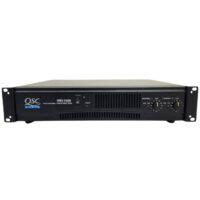When using passive speakers, an amplifier is a necessary component to drive them since passive speakers do not have built-in amplification. The quality and specifications of the amplifier you choose are crucial because the amplifier needs to match the requirements of the speakers to ensure optimal performance.
- Church Amplifier Selection:
- Power Output: The amplifier’s power output must match or exceed the power handling capacity of the speakers. Underpowered amplifiers can cause distortion, while overpowered ones can damage the speakers if not used properly.
- Impedance Matching: The amplifier’s output impedance should match the speaker’s impedance to ensure efficient power transfer and avoid potential damage.
- Church Speaker Capabilities:
- Different speakers are designed for specific roles in a sound system. For instance:
- Monitors: These are typically used for close-range listening, such as on-stage monitoring for performers.
- Mid Speakers: These handle mid-range frequencies and are often part of a multi-way speaker system.
- Different speakers are designed for specific roles in a sound system. For instance:
Specific Church Amplifier Models
- QSC 2450: This model is well-suited for driving monitor and mid speakers. It offers a balance of power and clarity, making it ideal for applications that don’t require extremely high power but demand reliable performance.
- QSC 4050: A more powerful amplifier capable of handling a greater number of speakers or those that require higher power. This makes it suitable for large-scale sound systems where high output is necessary.
Importance of Transistors in Church Amplifiers
- Quality over Quantity: The performance of an amplifier is not just about the number of transistors it contains but also the quality of these components. High-quality transistors can handle more power and offer better performance in terms of sound clarity, reliability, and efficiency.
- High-quality transistors: These provide stable performance, reduce distortion, and improve the overall sound quality.
- Low-quality transistors: Despite their number, they can lead to poor performance, higher distortion, and potential reliability issues.
Key Takeaways
- Matching Needs: When selecting an amplifier, consider the specific needs of your sound system. The right amplifier should complement your speakers and fulfill the requirements of your audio setup.
- Amplifier Specifications: Pay attention to power output, impedance, and the quality of internal components like transistors to ensure the best possible performance.
- Role-specific Amps: Choose amplifiers like the QSC 2450 for moderate power needs and precise roles like monitors, and the QSC 4050 for more demanding applications requiring higher power and the ability to drive multiple or more power-hungry speakers.
By understanding these principles, you can ensure that your passive speakers are driven effectively, providing high-quality sound for your specific audio needs
Showing 2 of 2 products





